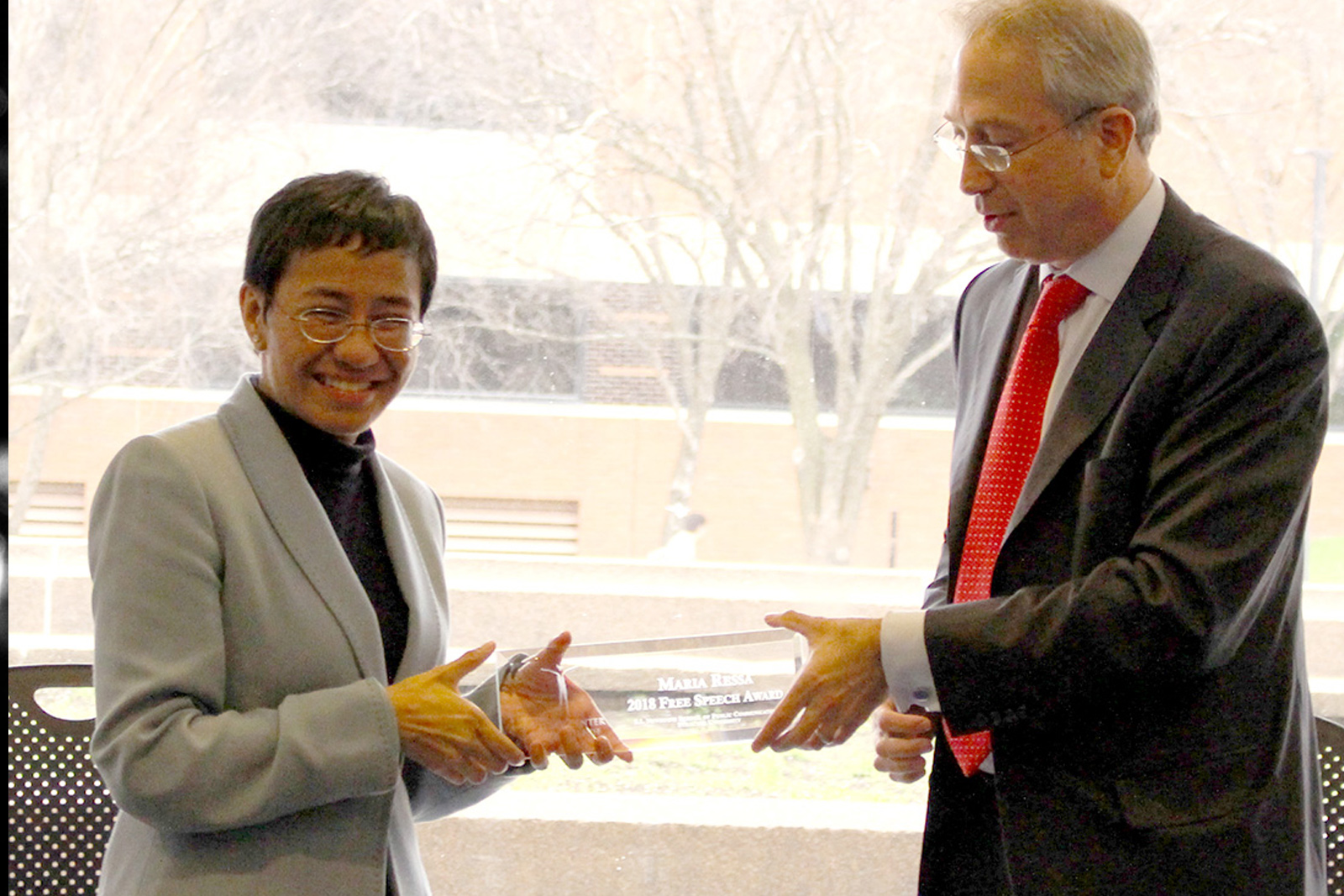Maria Ressa receives Tully Award for Free Speech

In a ceremony at the Newhouse School April 24, journalist Maria Ressa received the Tully Award for Free Speech for her work reporting on corruption in the Filipino government under president Rodrigo Duterte. The Tully Award for Free Speech is an annual award given to honor journalists who have shown courage in facing a free speech threat.
The discussion, moderated by associate professor and Tully Center for Free Speech director Roy Gutterman, covered Ressa’s experiences as a journalist writing about the Southeast Asia and terrorism beats for CNN for nearly two decades, and co-founding the online news site Rappler, which reports on events in the Philippines and Indonesia.
“I’m a bit of a cautionary tale for journalists who ask too many questions,” said Ressa as she talked about her experiences being harassed by the Filipino government for her work documenting the violence and corruption under Duterte’s rule. “I feel like Alice in Wonderland, and the Mad Hatter is in charge.”
Ressa co-founded Rappler in 2012 with the mission to “build communities of action,” using digital technology to feed investigative journalism into those communities.
“Rappler was one of the first to talk about social media for social good,” she said.
Going from managing a thousand people at CNN to being part of a team of 12, was a big transition, Ressa said. While technology has made content creation easier, social media has proven to be both a help and a hindrance.
“It’s never been so easy [to create and distribute content] but we never had to fight for attention the way we do today,” Ressa said. Making things even more complicated is that truth often fails to grab attention.
“The news is really boring,” she said. “Facts are really boring. What spreads fastest is anger and fear.”
The job of providing investigative journalism via Rappler, which has offices in both the Philippines and Indonesia, became dangerous with the election of populist president Rodrigo Duterte in June 2016. Duterte’s government almost immediately started harassing Filipino news outlets. In May of 2017, Duterte’s regime started a movement to get #ArrestMariaRessa trending on social media. Luckily for Ressa, the tactic failed.
“I think if it had trended, I wouldn’t be here. I’d probably be arrested,” she said.
In the 14 months between January 2018 and March 2019, 11 cases were filed against Ressa and other Rappler staff by the Filipino government. Ressa said she’s posted bail eight times, been arrested twice and detained once. Still, Ressa refuses to be intimidated.
“I’m not going to take it sitting down,” she said, “and I’m also not going to change who I am. The fear factor doesn’t work for me. I guess it’s like a game of chicken. Who will duck first?”
When describing Duterte, Ressa made a comparison to U.S. president Donald Trump, although Trump has had more restrictions put on his behavior than Duterte, she said. “Unlike the United States, where your institutions kicked back, our institutions caved in.”
Duterte’s appeal is similar to Trump’s, Ressa said. Duterte would say things that politicians wouldn’t ordinarily say, she said, coming across as refreshing and authentic, all while serving lies to the populace that eventually changed the national discourse in the Philippines. Duterte’s communications strategy was effective in moving drugs from a mid-level concern of Filipinos to number one, and Duterte promised to rid the country of a problem he largely invented. The violent and deadly drug war that resulted from his election became the cornerstone of his governance, Ressa said, and attacking journalists was the first step to creating a lack of trust, which is essential for tactics like these to succeed.
“When you say a lie a million times, it [becomes] the truth,” Ressa said. “When [people] don’t know who to believe, the person with the biggest megaphone wins.”
Despite the uphill climb and personal risk involved with continuing to report in the Philippines, Ressa says she has no intention of stopping her work.
“I keep going back because I want every single step in this descent to tyranny chronicled,” she said, adding that eventually people will be held accountable for their actions, and documenting what’s happening will be essential to that process.
Ressa expressed concern about the Filipino midterm elections in May. “If we lose an independent senate, the new legislature can push through a new constitution. With a new constitution, we will no longer be a democracy.”
“I’m reminding you how quickly you can lose your democracy,” Ressa said. “The time to fight for your rights is when you still have a voice to fight for your rights.”